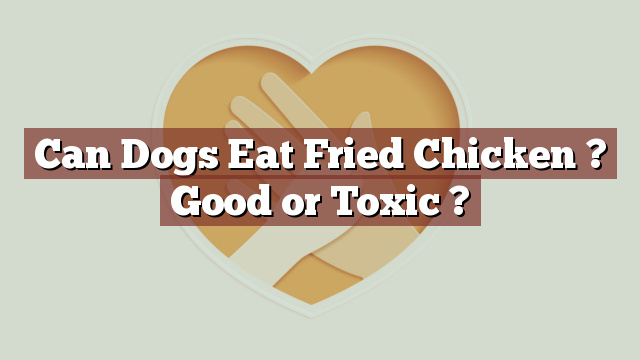Can dogs eat fried chicken? This is a common question that pet owners often ask when it comes to sharing their meals with their beloved canine companions. As responsible pet owners, it is crucial to be aware of which foods are safe for our dogs to consume. In this article, we will explore the nutritional value of fried chicken, whether it is safe or toxic for dogs, potential risks or benefits of feeding dogs fried chicken, and what steps to take if your dog happens to eat this popular human food.
Nutritional Value of Fried Chicken: What Does It Contain?
Fried chicken is a popular dish enjoyed by many people around the world. It is typically made by coating chicken pieces in a batter and deep-frying them until golden brown. While fried chicken is undoubtedly delicious for us, it is important to note that it is not particularly nutritious. It is high in fat, calories, and sodium, and lacks essential nutrients that dogs need for optimal health.
Can Dogs Eat Fried Chicken? Is It Safe or Toxic?
No, dogs should not eat fried chicken. While dogs can technically consume small amounts of cooked chicken as part of a balanced diet, the fried aspect of fried chicken poses several risks. The high fat content in fried chicken can lead to digestive issues, such as pancreatitis, which can be extremely dangerous for dogs. Additionally, the batter used in fried chicken may contain ingredients such as garlic, onion, or spices that are toxic to dogs. These ingredients can cause gastrointestinal upset, anemia, or even damage to their red blood cells.
Potential Risks or Benefits of Feeding Dogs Fried Chicken
Feeding fried chicken to dogs can have severe consequences for their health. The high fat content can lead to obesity and contribute to the development of heart disease. The excess sodium found in fried chicken can also be harmful, potentially leading to dehydration and kidney problems in dogs. Moreover, the presence of toxic ingredients in the batter can result in adverse reactions and even poisoning in dogs.
On the other hand, there are no significant benefits to feeding fried chicken to dogs. It does not provide the necessary nutrients that dogs require and can potentially cause harm.
What to Do If Your Dog Eats Fried Chicken: Steps to Take
If your dog happens to consume fried chicken, it is essential to take immediate action. Firstly, assess the situation and determine the quantity of fried chicken consumed. If it was a small amount, closely monitor your dog for any signs of gastrointestinal distress, such as vomiting or diarrhea. Provide plenty of fresh water to keep them hydrated.
However, if your dog consumed a large amount of fried chicken or displays any concerning symptoms, it is crucial to contact your veterinarian immediately. They will be able to provide professional guidance and recommend appropriate steps to ensure your dog’s health and well-being.
Conclusion: Balancing Safety and Treats for Your Canine Companion
In conclusion, dogs should not eat fried chicken. While it may be tempting to share our favorite meals with our furry friends, it is essential to prioritize their health and safety. Fried chicken is high in fat, calories, and sodium, lacking the necessary nutrients for dogs. Additionally, the batter used in fried chicken may contain toxic ingredients. If your dog accidentally consumes fried chicken, it is important to take appropriate steps to minimize any potential harm and consult with a veterinarian if necessary. Remember, it is always better to provide treats specifically formulated for dogs to ensure their nutritional needs are met while keeping them safe.
Thank you for investing your time in exploring [page_title] on Can-Eat.org. Our goal is to provide readers like you with thorough and reliable information about various dietary topics. Each article, including [page_title], stems from diligent research and a passion for understanding the nuances of our food choices. We believe that knowledge is a vital step towards making informed and healthy decisions. However, while "[page_title]" sheds light on its specific topic, it's crucial to remember that everyone's body reacts differently to foods and dietary changes. What might be beneficial for one person could have different effects on another. Before you consider integrating suggestions or insights from "[page_title]" into your diet, it's always wise to consult with a nutritionist or healthcare professional. Their specialized knowledge ensures that you're making choices best suited to your individual health needs. As you navigate [page_title], be mindful of potential allergies, intolerances, or unique dietary requirements you may have. No singular article can capture the vast diversity of human health, and individualized guidance is invaluable. The content provided in [page_title] serves as a general guide. It is not, by any means, a substitute for personalized medical or nutritional advice. Your health should always be the top priority, and professional guidance is the best path forward. In your journey towards a balanced and nutritious lifestyle, we hope that [page_title] serves as a helpful stepping stone. Remember, informed decisions lead to healthier outcomes. Thank you for trusting Can-Eat.org. Continue exploring, learning, and prioritizing your health. Cheers to a well-informed and healthier future!

